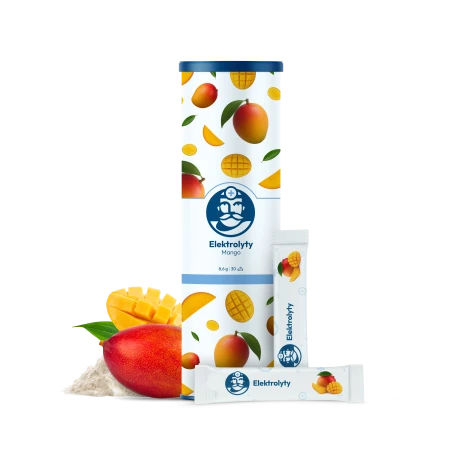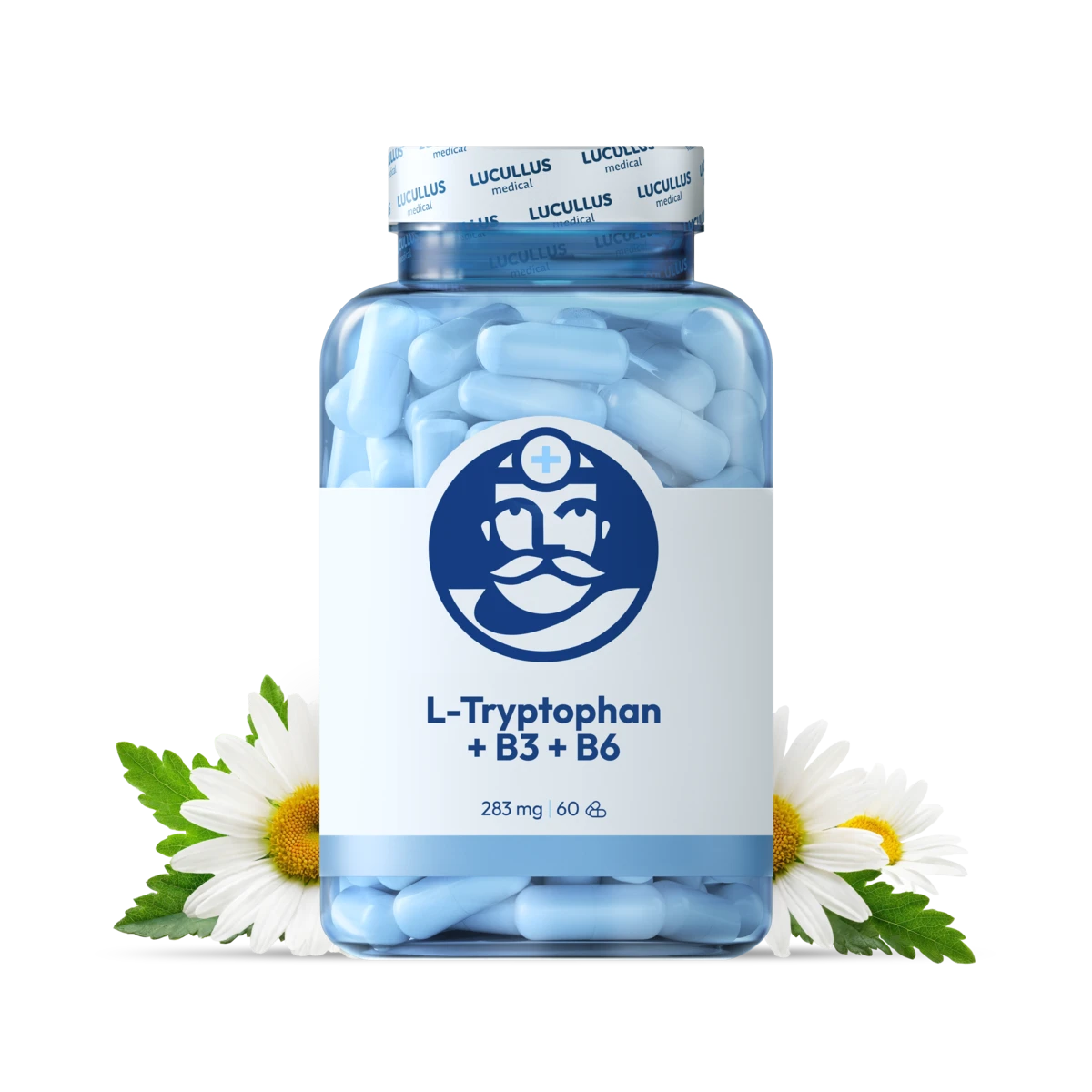
Účinky
Hydration SupportElectrolyte BalanceImmune System SupportCell ProtectionIncreased Vitality
Pack of 60 capsules
Pack of 130 capsules
| Active ingredient | In daily dose | % Ref |
|---|---|---|
| L-Tryptophan | 450 mg | - |
| Camomile (Matricaria recutita) | 100 mg | - |
| Vitamin B6 (pyridoxine hydrochloride) | 10 mg | 71.40% |
| Vitamin B3 (nicotinamide) | 5 mg | 31.20% |
Ingredients: L-tryptophan, camomile, pyridoxine hydrochloride, nicotinamide, bulking agent: microcrystalline cellulose, capsule made of gelatin and water.

By following the recommended dosage, I noticed a significant improvement in my mood and overall vitality.
L-Tryptophan + B3 + B6 helped me with stress reduction. I recommend it to everyone.
After a month of taking it, I feel less stressed and more relaxed.
Since I started taking it I am in a better mood and feel more at ease.
I was skeptical, but now I'm excited. My sleep is finally of good quality.

In each of our recipes, we invest in research to identify the right ingredients, compounds, and doses to achieve real benefits. We then manufacture our unique recipes in the most modern facilities in Slovakia.
The compound, which will promote quality sleep and a positive mood, contains the essential amino acid L-tryptophan, as well as vitamins B3 and B6, which allow its conversion into serotonin, the hormone of well-being, and melatonin, the sleep hormone.
The powerful antioxidant is known for its positive effects on the skin, while also aiding digestion, lowering cholesterol and mental stress.
As an important cofactor of enzymes, it participates in more than 100 reactions, helps to accelerate metabolism and chemical reactions in cells, and promotes mental activity.

Read the latest news about quality dietary supplements, vitamins, immunity, and health.

Okrem známeho B-Komplex mix vitamínov skupiny B, je možné jednotlivé vitamíny kupovať aj ako soľ. Načo je to dobré? Známy súbor vitamínov skupiny B je vhodný doplnok výživy, máte celkový nedostatok vitamínov v tele. Ak však neriešite konkrétny problém, je niekedy vhodnejší konkrétny typ vitamínu, ktorý potrebujete doplniť. Načo je teda potrebný vitamín B2?

V naturálnom doplnku je ukrytá menej známa rastlina diskórea huňatá ( Discorea villosa, Wild yam) z čeľade Dioscoreaceae. Poďme sa s ňou zoznámiť ☺ Existuje viac ako 600 druhov rastlín yam, najvýraznejší druh je divoký yam (Dioscorea villosa). Táto trvá nenáročná liana (vinič) rovníkových oblastí, má listy v tvare srdca. V listoch a koreňoch je prítomný diosgenín (primárna zložka), práve koreň sa používa v medicíne aj v našich doplnkoch, ako koncentrovaný extrakt (najvyššia výťažnosť), štruktúra je podobný cholesterol. Táto látka sa používala na výrobu prvých antikoncepčných podkladov.

V dnešnej dobe podliehajúcej každodennému stresu je čoraz dôležitejšie dodávať telu silu prírody. Mužská vitalita je doplnkom z najefektívnejších rastlín. Unikátny vytvorený vzorec ušita na mieru pre potreby moderného človeka a jeho aktívny spôsob života. Pre viac energie a zvýšenie výkonu v práci aj nie, aby ste mohli naplno prežívať všetky dobrodružstvá, ktoré Vás čakajú.

Púpava (anglicky dandelion, latinsky Taraxum officinale, inak aj mlieč, smotánka, májik) je každému dobre a všade prítomná burina (hlavne ak sa z tej medicíny nič nevyskytuje cez noc na perfektnom zelenom trávniku, vyrastie dokonca v štrbine asfaltu), v prvom rade je to liečivá rastlina v bylinke dlho jeho. Mliečne kanáliky obsahujú bielu šťavu, ktorá tuhne na vzduchu a zanecháva farebné škvrny na rukách. Semená púpavy dokážu precestovať kilometer. Patrí medzi najdlhšie kvitnúce rastliny, celá je jedlá avšak s nie veľmi príjemnou horkastou chuťou.

Vitamín B3 - niacín, možno aj starší poznajú aj pod názvom P. Patrí do skupiny vitamínov B, ktoré nájdeme v multiformnom B-komplexe. Je to veľmi dôležitá skupina, ktorú potrebujete pre správnu funkciu zraku, slizníc, kože, srdca... V prípade potreby potrebujete pre správne fungovanie srdcovej, svalovej a nervovej činnosti.

“Is it just another vitamin... or?” one might think, but the more we learn about pantothenic acid, the more it fascinates us. Vitamin B5 plays a crucial role in converting food into energy, supports concentration, mental well-being, and even skin regeneration. Without it, the body would not be able to properly produce hormones or fight stress. It is also a substance that is hidden in every cell of our body, accompanies us from birth, and contributes to sufficient energy, skin health, and mental acuity. Although we may overlook it, its importance is undeniable, and its name is no coincidence. It comes from the Greek word “panto”, meaning “everywhere.” And indeed, it is omnipresent, irreplaceable, and somewhat mysterious. If we start exploring where this essential vitamin is found, it's in eggs, nuts, whole grains, shellfish, avocados, salmon, liver, kidneys, beef, yeast, vegetables... And if we've just realized that our diet is low in these foods, we should consider supplementing B5. After just a few days, we would notice a change. We would wake up with more energy, have a clearer mind, and even see an improvement in our skin. Colleagues would notice that we work faster, are more creative, and less stressed. Pantothenic acid will help us get back in shape. And for us, it will no longer be just another substance on the list of vitamins.